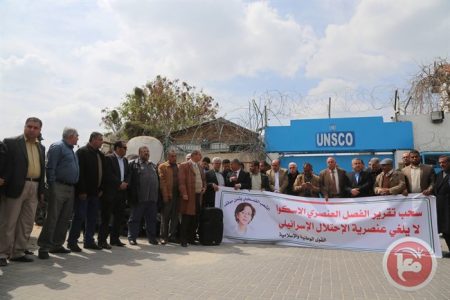Palestinians demonstrated outside the United Nations Special Coordinator Office (UNSCO) in Gaza City, on Tuesday, in protest of the UN’s decision to withdraw a report prepared by the UN Economic and Social Commission for Western Asia (ESCWA), which accused Israel of apartheid policies.
Protesters expressed support for ESCWA chief Rima Khalaf, who resigned from her post on Friday, after she said she was pressured by UN Secretary-General Antonio Guterres to remove the report.
A joint statement issued Tuesday by Palestinian Human Rights Organizations (PHROC), addressed to Guterres, said the groups were “dismayed” by his decision to withdraw the report, and vowed to “adopt the analysis and conclusions contained therein in an effort to achieve justice for the Palestinian people.”
“It is our belief that the withdrawal of this report will contribute to the commission of further violations by Israel, the occupying power, especially in light of a continued politicization of the application of international law.”
PHROC said, according to Ma’an News Agency, that the report “professionally” addressed the reality that Palestinians have been subjected to “under the Israeli occupation and its colonial policies that have been based on racial discrimination” since the state of Israel was established in 1948.
The statement also lauded the report for “objectively” conveying the various legal procedures and “separate and unequal practices towards the Palestinian people, who Israel has sought to divide into different groups” — namely those with Israeli citizenship, residency status in occupied East Jerusalem, those living within the occupied West Bank or the besieged Gaza Strip, or the diaspora living abroad.
“The withdrawal of the report from the ESCWA website as a result of political pressure is at odds with the principles upon which the United Nations was founded” and with “international humanitarian law and international human rights law upon which the report is based,” the statement said.
PHROC concluded by calling upon the International Criminal Court (ICC) to take the report into consideration during its preliminary examination into the situation in the occupied Palestinian territory.
Palestinian People’s Party politburo member Walid al-Awad said, at the sit-in, that the letter was sent to pressure Guterres to undertake “tangible” procedures against the Israeli occupation “for its racist practices plainly mentioned in the report.”
Al-Awad applauded Khalaf for “her courageous humanitarian position in preferring to resign rather than withdraw the report.”
The official reason for the report’s removal given by Guterres’ spokesperson Stephane Dujarric was not over the content of the report itself, but rather with the fact that it had allegedly been published without consulting with the UN secretariat.
However, PHROC was not the first to accuse the UN of caving to pressure by Israel and UN member states to bury the report for being too critical of Israeli violations against Palestinians.
The report, which has been published in full elsewhere after being removed from ESCWA’s website on Friday, notably concluded that Israel was guilty “beyond a reasonable doubt” of imposing apartheid policies against Palestinians, and urged the international community to abide by its “legal obligation” to punish such discriminatory measures.
“Aware of the seriousness of this allegation, the authors of the report conclude that available evidence establishes beyond a reasonable doubt that Israel is guilty of policies and practices that constitute the crime of apartheid as legally defined in instruments of international law,” an executive summary of the report read.
Palestinians, activists, and a number of intellectuals have increasingly compared Israel’s occupation of the Palestinian territory with an apartheid system over the years, and sought to use similar tactics as those that took down the apartheid regime in South Africa.
The Boycott, Divestment, and Sanctions (BDS) movement founded in 2005 as a peaceful movement to restore Palestinian rights in accordance with international law has been largely influenced by the South African anti-apartheid movement in the 1980s.
Search IMEMC: “boycott”

